Evaluation of Direct Care Project Part 1: CNOR Certification
VerifiedAdded on 2023/01/13
|7
|1614
|25
Report
AI Summary
This report presents an evaluation of a direct care project focused on Certified Operating Room Nurse (CNOR) certification. The project involved pre and post-surveys to assess nurses' knowledge and understanding of CNOR certification. The findings revealed an increase in knowledge after the presentation, highlighting the importance of the certification, its acquisition process, and its implications for professional development. The report also discusses the project's reflection, including the overall experience of teaching the nurses, and the outcomes of the surveys. Furthermore, the report identifies gaps in the project, such as the lack of stakeholder involvement and insufficient data, and barriers encountered, including reactive participants and limited time. The implications for future practice are also discussed, emphasizing the project's impact on understanding the significance of CNOR certification, patient safety, and the need for continuous professional development. The report concludes with a list of references used in the project.
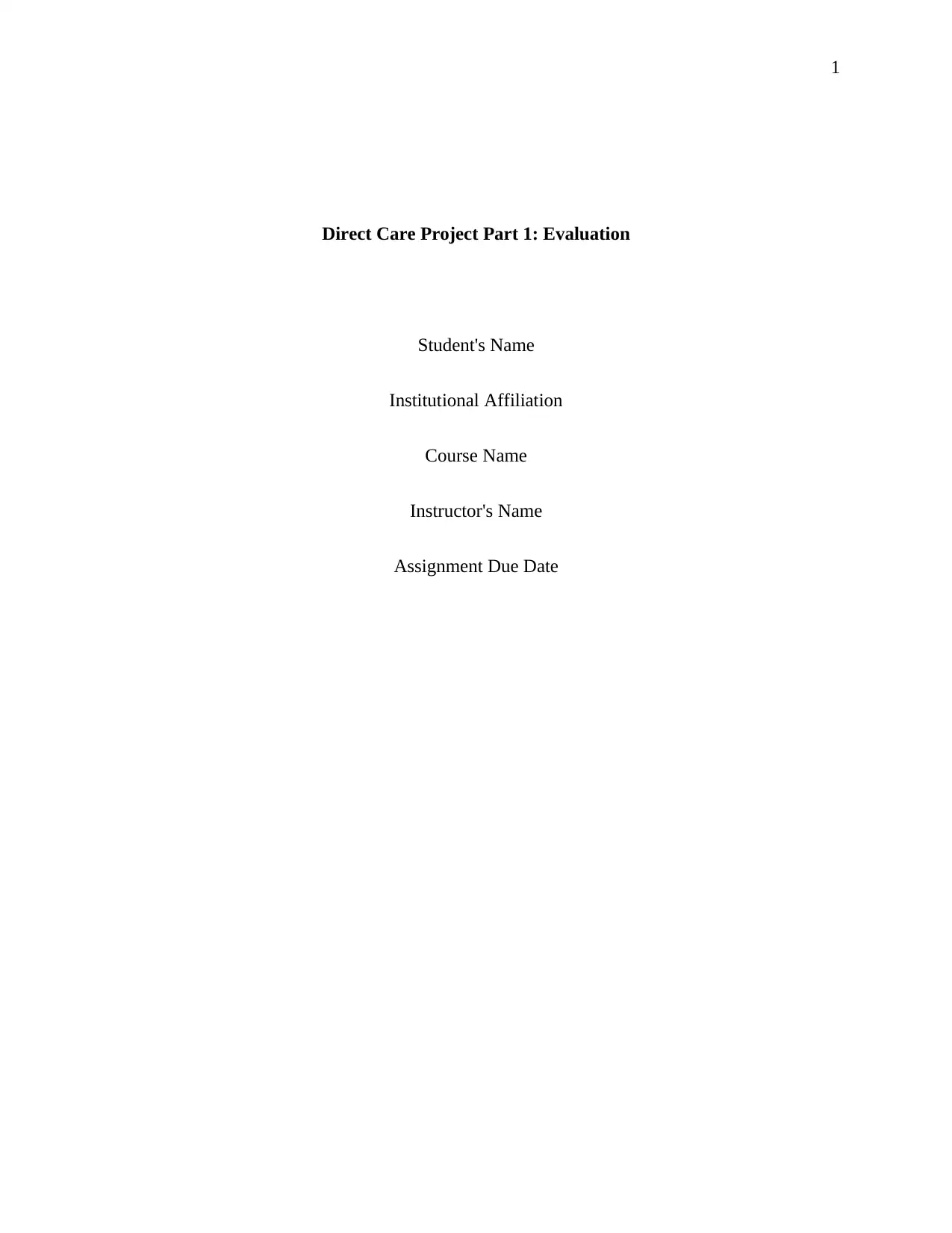
1
Direct Care Project Part 1: Evaluation
Student's Name
Institutional Affiliation
Course Name
Instructor's Name
Assignment Due Date
Direct Care Project Part 1: Evaluation
Student's Name
Institutional Affiliation
Course Name
Instructor's Name
Assignment Due Date
Paraphrase This Document
Need a fresh take? Get an instant paraphrase of this document with our AI Paraphraser
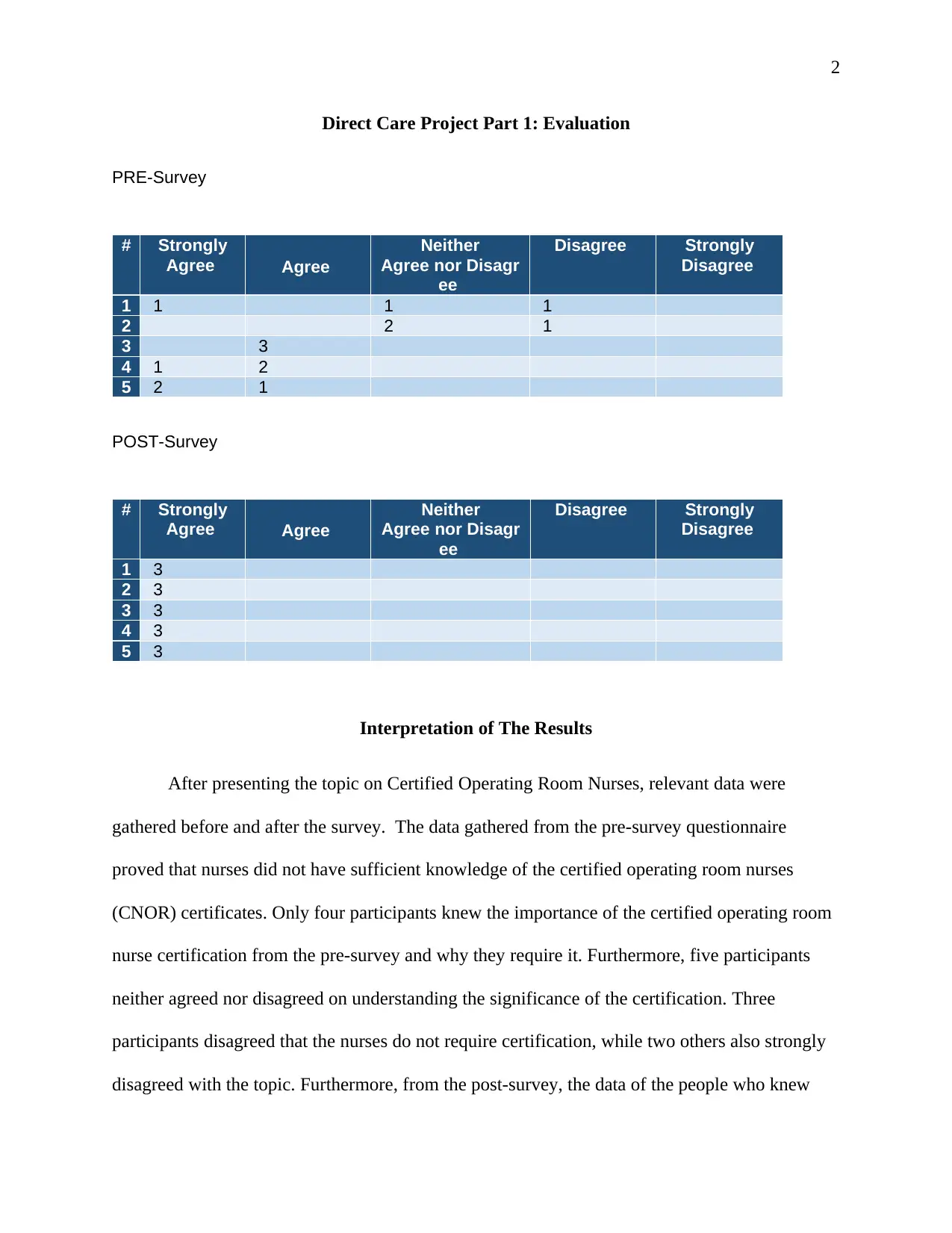
2
Direct Care Project Part 1: Evaluation
PRE-Survey
# Strongly
Agree Agree
Neither
Agree nor Disagr
ee
Disagree Strongly
Disagree
1 1 1 1
2 2 1
3 3
4 1 2
5 2 1
POST-Survey
# Strongly
Agree Agree
Neither
Agree nor Disagr
ee
Disagree Strongly
Disagree
1 3
2 3
3 3
4 3
5 3
Interpretation of The Results
After presenting the topic on Certified Operating Room Nurses, relevant data were
gathered before and after the survey. The data gathered from the pre-survey questionnaire
proved that nurses did not have sufficient knowledge of the certified operating room nurses
(CNOR) certificates. Only four participants knew the importance of the certified operating room
nurse certification from the pre-survey and why they require it. Furthermore, five participants
neither agreed nor disagreed on understanding the significance of the certification. Three
participants disagreed that the nurses do not require certification, while two others also strongly
disagreed with the topic. Furthermore, from the post-survey, the data of the people who knew
Direct Care Project Part 1: Evaluation
PRE-Survey
# Strongly
Agree Agree
Neither
Agree nor Disagr
ee
Disagree Strongly
Disagree
1 1 1 1
2 2 1
3 3
4 1 2
5 2 1
POST-Survey
# Strongly
Agree Agree
Neither
Agree nor Disagr
ee
Disagree Strongly
Disagree
1 3
2 3
3 3
4 3
5 3
Interpretation of The Results
After presenting the topic on Certified Operating Room Nurses, relevant data were
gathered before and after the survey. The data gathered from the pre-survey questionnaire
proved that nurses did not have sufficient knowledge of the certified operating room nurses
(CNOR) certificates. Only four participants knew the importance of the certified operating room
nurse certification from the pre-survey and why they require it. Furthermore, five participants
neither agreed nor disagreed on understanding the significance of the certification. Three
participants disagreed that the nurses do not require certification, while two others also strongly
disagreed with the topic. Furthermore, from the post-survey, the data of the people who knew
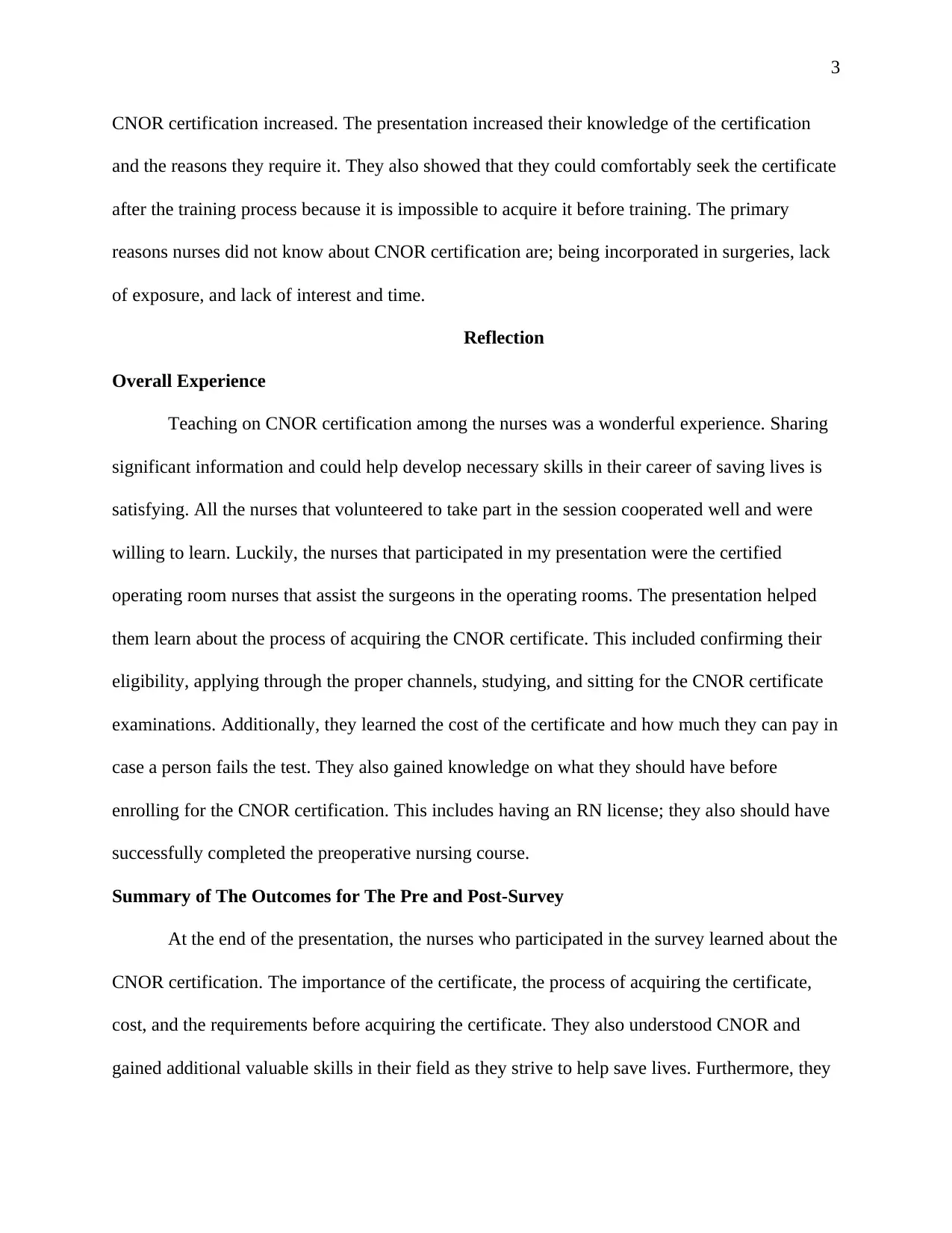
3
CNOR certification increased. The presentation increased their knowledge of the certification
and the reasons they require it. They also showed that they could comfortably seek the certificate
after the training process because it is impossible to acquire it before training. The primary
reasons nurses did not know about CNOR certification are; being incorporated in surgeries, lack
of exposure, and lack of interest and time.
Reflection
Overall Experience
Teaching on CNOR certification among the nurses was a wonderful experience. Sharing
significant information and could help develop necessary skills in their career of saving lives is
satisfying. All the nurses that volunteered to take part in the session cooperated well and were
willing to learn. Luckily, the nurses that participated in my presentation were the certified
operating room nurses that assist the surgeons in the operating rooms. The presentation helped
them learn about the process of acquiring the CNOR certificate. This included confirming their
eligibility, applying through the proper channels, studying, and sitting for the CNOR certificate
examinations. Additionally, they learned the cost of the certificate and how much they can pay in
case a person fails the test. They also gained knowledge on what they should have before
enrolling for the CNOR certification. This includes having an RN license; they also should have
successfully completed the preoperative nursing course.
Summary of The Outcomes for The Pre and Post-Survey
At the end of the presentation, the nurses who participated in the survey learned about the
CNOR certification. The importance of the certificate, the process of acquiring the certificate,
cost, and the requirements before acquiring the certificate. They also understood CNOR and
gained additional valuable skills in their field as they strive to help save lives. Furthermore, they
CNOR certification increased. The presentation increased their knowledge of the certification
and the reasons they require it. They also showed that they could comfortably seek the certificate
after the training process because it is impossible to acquire it before training. The primary
reasons nurses did not know about CNOR certification are; being incorporated in surgeries, lack
of exposure, and lack of interest and time.
Reflection
Overall Experience
Teaching on CNOR certification among the nurses was a wonderful experience. Sharing
significant information and could help develop necessary skills in their career of saving lives is
satisfying. All the nurses that volunteered to take part in the session cooperated well and were
willing to learn. Luckily, the nurses that participated in my presentation were the certified
operating room nurses that assist the surgeons in the operating rooms. The presentation helped
them learn about the process of acquiring the CNOR certificate. This included confirming their
eligibility, applying through the proper channels, studying, and sitting for the CNOR certificate
examinations. Additionally, they learned the cost of the certificate and how much they can pay in
case a person fails the test. They also gained knowledge on what they should have before
enrolling for the CNOR certification. This includes having an RN license; they also should have
successfully completed the preoperative nursing course.
Summary of The Outcomes for The Pre and Post-Survey
At the end of the presentation, the nurses who participated in the survey learned about the
CNOR certification. The importance of the certificate, the process of acquiring the certificate,
cost, and the requirements before acquiring the certificate. They also understood CNOR and
gained additional valuable skills in their field as they strive to help save lives. Furthermore, they
⊘ This is a preview!⊘
Do you want full access?
Subscribe today to unlock all pages.

Trusted by 1+ million students worldwide
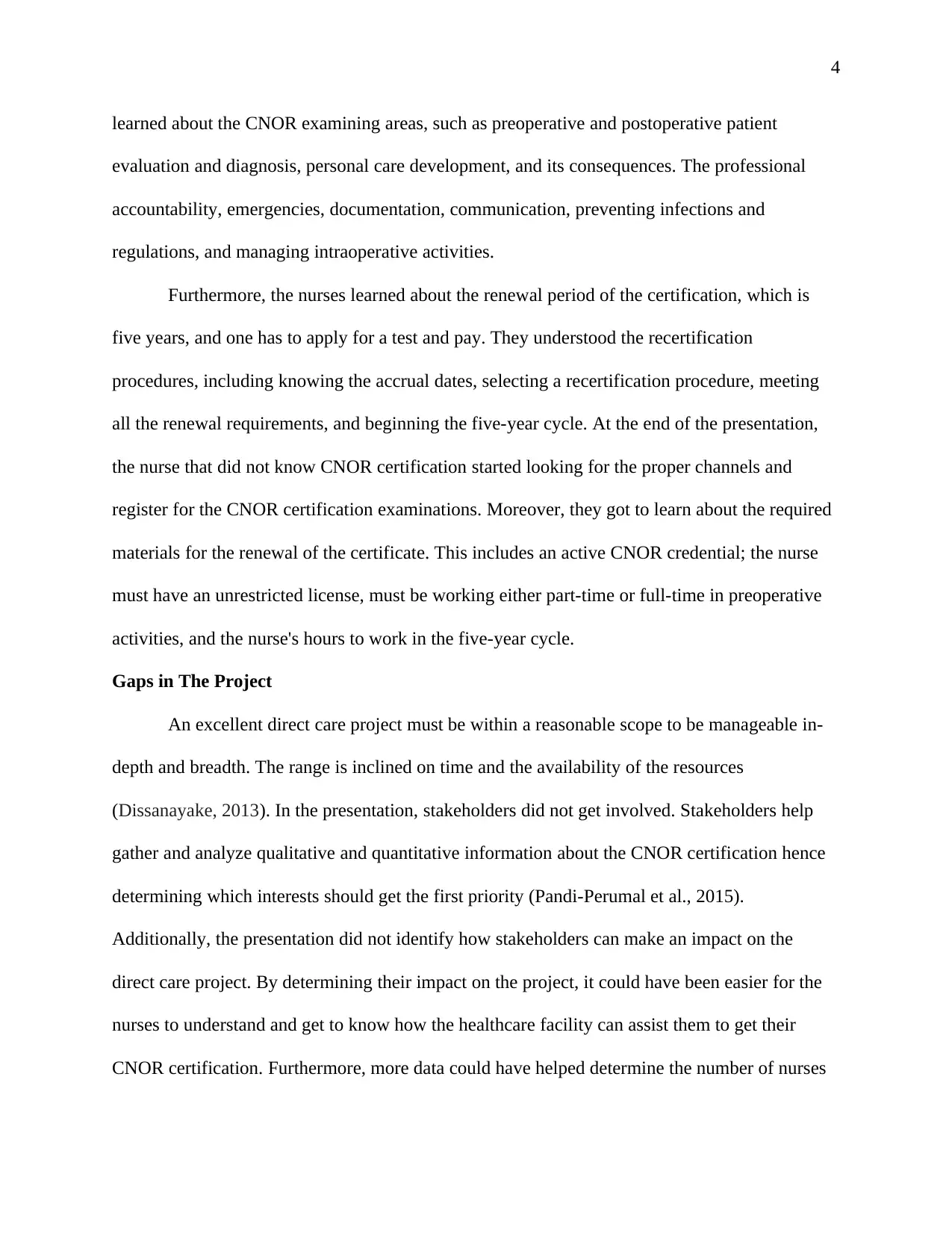
4
learned about the CNOR examining areas, such as preoperative and postoperative patient
evaluation and diagnosis, personal care development, and its consequences. The professional
accountability, emergencies, documentation, communication, preventing infections and
regulations, and managing intraoperative activities.
Furthermore, the nurses learned about the renewal period of the certification, which is
five years, and one has to apply for a test and pay. They understood the recertification
procedures, including knowing the accrual dates, selecting a recertification procedure, meeting
all the renewal requirements, and beginning the five-year cycle. At the end of the presentation,
the nurse that did not know CNOR certification started looking for the proper channels and
register for the CNOR certification examinations. Moreover, they got to learn about the required
materials for the renewal of the certificate. This includes an active CNOR credential; the nurse
must have an unrestricted license, must be working either part-time or full-time in preoperative
activities, and the nurse's hours to work in the five-year cycle.
Gaps in The Project
An excellent direct care project must be within a reasonable scope to be manageable in-
depth and breadth. The range is inclined on time and the availability of the resources
(Dissanayake, 2013). In the presentation, stakeholders did not get involved. Stakeholders help
gather and analyze qualitative and quantitative information about the CNOR certification hence
determining which interests should get the first priority (Pandi-Perumal et al., 2015).
Additionally, the presentation did not identify how stakeholders can make an impact on the
direct care project. By determining their impact on the project, it could have been easier for the
nurses to understand and get to know how the healthcare facility can assist them to get their
CNOR certification. Furthermore, more data could have helped determine the number of nurses
learned about the CNOR examining areas, such as preoperative and postoperative patient
evaluation and diagnosis, personal care development, and its consequences. The professional
accountability, emergencies, documentation, communication, preventing infections and
regulations, and managing intraoperative activities.
Furthermore, the nurses learned about the renewal period of the certification, which is
five years, and one has to apply for a test and pay. They understood the recertification
procedures, including knowing the accrual dates, selecting a recertification procedure, meeting
all the renewal requirements, and beginning the five-year cycle. At the end of the presentation,
the nurse that did not know CNOR certification started looking for the proper channels and
register for the CNOR certification examinations. Moreover, they got to learn about the required
materials for the renewal of the certificate. This includes an active CNOR credential; the nurse
must have an unrestricted license, must be working either part-time or full-time in preoperative
activities, and the nurse's hours to work in the five-year cycle.
Gaps in The Project
An excellent direct care project must be within a reasonable scope to be manageable in-
depth and breadth. The range is inclined on time and the availability of the resources
(Dissanayake, 2013). In the presentation, stakeholders did not get involved. Stakeholders help
gather and analyze qualitative and quantitative information about the CNOR certification hence
determining which interests should get the first priority (Pandi-Perumal et al., 2015).
Additionally, the presentation did not identify how stakeholders can make an impact on the
direct care project. By determining their impact on the project, it could have been easier for the
nurses to understand and get to know how the healthcare facility can assist them to get their
CNOR certification. Furthermore, more data could have helped determine the number of nurses
Paraphrase This Document
Need a fresh take? Get an instant paraphrase of this document with our AI Paraphraser
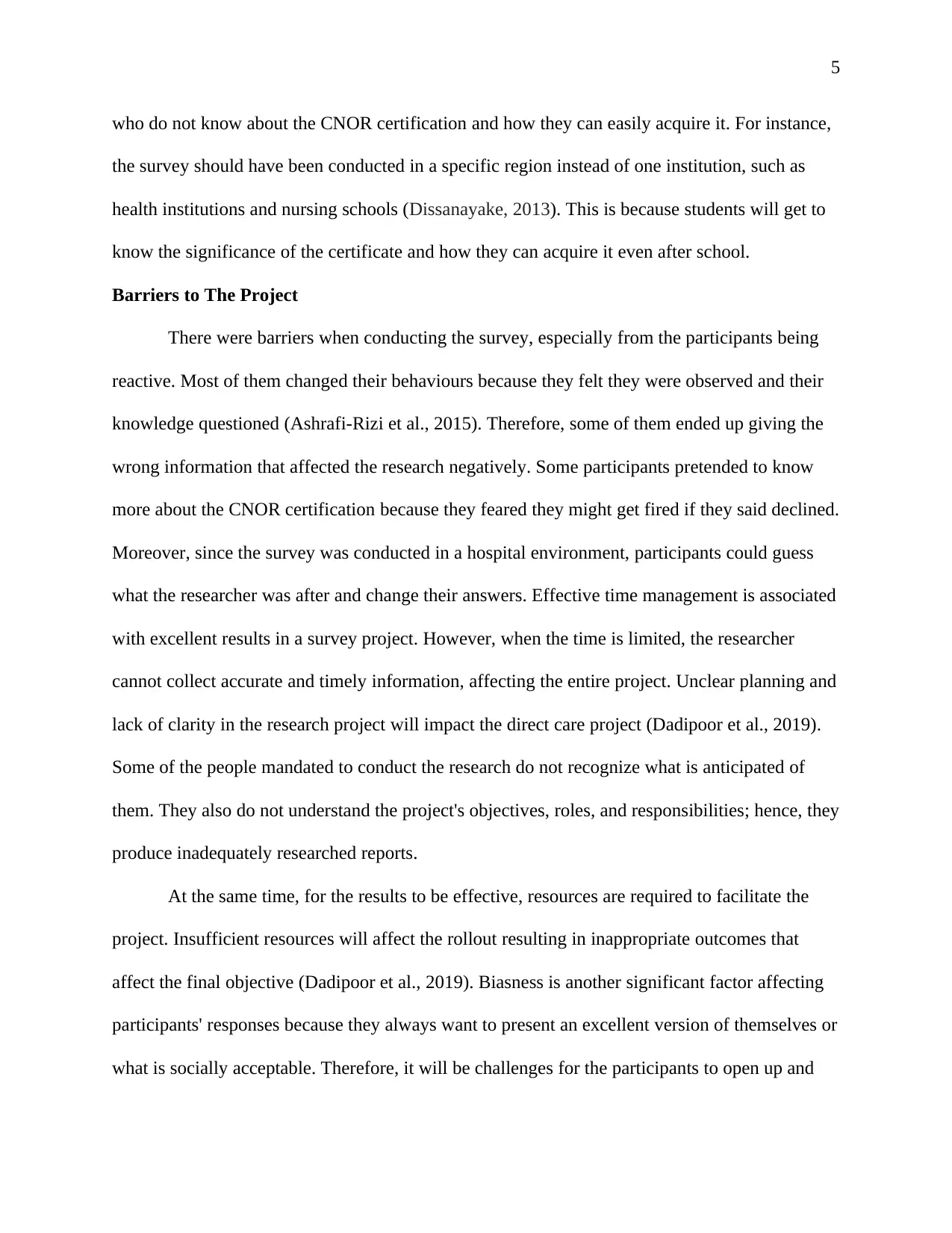
5
who do not know about the CNOR certification and how they can easily acquire it. For instance,
the survey should have been conducted in a specific region instead of one institution, such as
health institutions and nursing schools (Dissanayake, 2013). This is because students will get to
know the significance of the certificate and how they can acquire it even after school.
Barriers to The Project
There were barriers when conducting the survey, especially from the participants being
reactive. Most of them changed their behaviours because they felt they were observed and their
knowledge questioned (Ashrafi-Rizi et al., 2015). Therefore, some of them ended up giving the
wrong information that affected the research negatively. Some participants pretended to know
more about the CNOR certification because they feared they might get fired if they said declined.
Moreover, since the survey was conducted in a hospital environment, participants could guess
what the researcher was after and change their answers. Effective time management is associated
with excellent results in a survey project. However, when the time is limited, the researcher
cannot collect accurate and timely information, affecting the entire project. Unclear planning and
lack of clarity in the research project will impact the direct care project (Dadipoor et al., 2019).
Some of the people mandated to conduct the research do not recognize what is anticipated of
them. They also do not understand the project's objectives, roles, and responsibilities; hence, they
produce inadequately researched reports.
At the same time, for the results to be effective, resources are required to facilitate the
project. Insufficient resources will affect the rollout resulting in inappropriate outcomes that
affect the final objective (Dadipoor et al., 2019). Biasness is another significant factor affecting
participants' responses because they always want to present an excellent version of themselves or
what is socially acceptable. Therefore, it will be challenges for the participants to open up and
who do not know about the CNOR certification and how they can easily acquire it. For instance,
the survey should have been conducted in a specific region instead of one institution, such as
health institutions and nursing schools (Dissanayake, 2013). This is because students will get to
know the significance of the certificate and how they can acquire it even after school.
Barriers to The Project
There were barriers when conducting the survey, especially from the participants being
reactive. Most of them changed their behaviours because they felt they were observed and their
knowledge questioned (Ashrafi-Rizi et al., 2015). Therefore, some of them ended up giving the
wrong information that affected the research negatively. Some participants pretended to know
more about the CNOR certification because they feared they might get fired if they said declined.
Moreover, since the survey was conducted in a hospital environment, participants could guess
what the researcher was after and change their answers. Effective time management is associated
with excellent results in a survey project. However, when the time is limited, the researcher
cannot collect accurate and timely information, affecting the entire project. Unclear planning and
lack of clarity in the research project will impact the direct care project (Dadipoor et al., 2019).
Some of the people mandated to conduct the research do not recognize what is anticipated of
them. They also do not understand the project's objectives, roles, and responsibilities; hence, they
produce inadequately researched reports.
At the same time, for the results to be effective, resources are required to facilitate the
project. Insufficient resources will affect the rollout resulting in inappropriate outcomes that
affect the final objective (Dadipoor et al., 2019). Biasness is another significant factor affecting
participants' responses because they always want to present an excellent version of themselves or
what is socially acceptable. Therefore, it will be challenges for the participants to open up and
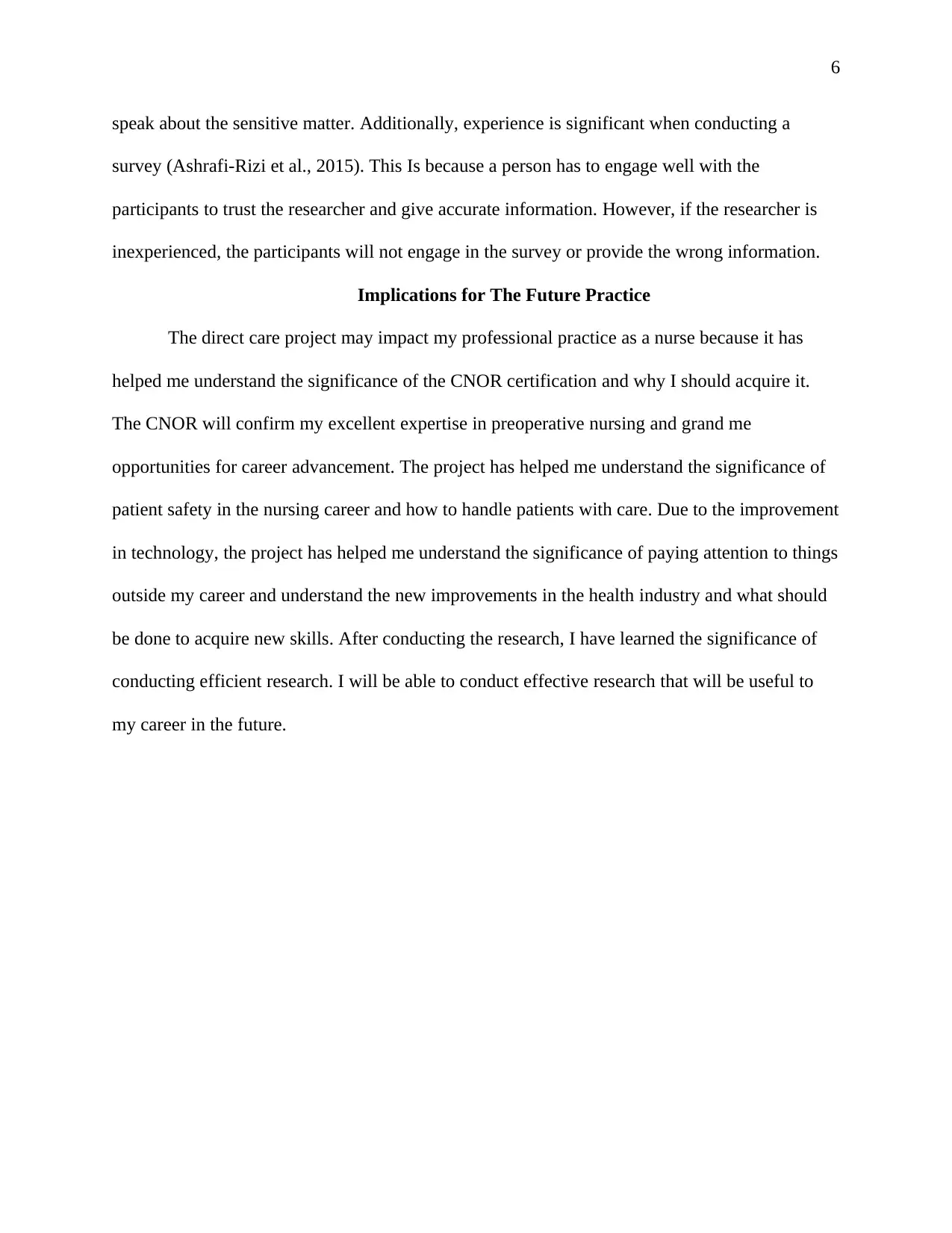
6
speak about the sensitive matter. Additionally, experience is significant when conducting a
survey (Ashrafi-Rizi et al., 2015). This Is because a person has to engage well with the
participants to trust the researcher and give accurate information. However, if the researcher is
inexperienced, the participants will not engage in the survey or provide the wrong information.
Implications for The Future Practice
The direct care project may impact my professional practice as a nurse because it has
helped me understand the significance of the CNOR certification and why I should acquire it.
The CNOR will confirm my excellent expertise in preoperative nursing and grand me
opportunities for career advancement. The project has helped me understand the significance of
patient safety in the nursing career and how to handle patients with care. Due to the improvement
in technology, the project has helped me understand the significance of paying attention to things
outside my career and understand the new improvements in the health industry and what should
be done to acquire new skills. After conducting the research, I have learned the significance of
conducting efficient research. I will be able to conduct effective research that will be useful to
my career in the future.
speak about the sensitive matter. Additionally, experience is significant when conducting a
survey (Ashrafi-Rizi et al., 2015). This Is because a person has to engage well with the
participants to trust the researcher and give accurate information. However, if the researcher is
inexperienced, the participants will not engage in the survey or provide the wrong information.
Implications for The Future Practice
The direct care project may impact my professional practice as a nurse because it has
helped me understand the significance of the CNOR certification and why I should acquire it.
The CNOR will confirm my excellent expertise in preoperative nursing and grand me
opportunities for career advancement. The project has helped me understand the significance of
patient safety in the nursing career and how to handle patients with care. Due to the improvement
in technology, the project has helped me understand the significance of paying attention to things
outside my career and understand the new improvements in the health industry and what should
be done to acquire new skills. After conducting the research, I have learned the significance of
conducting efficient research. I will be able to conduct effective research that will be useful to
my career in the future.
⊘ This is a preview!⊘
Do you want full access?
Subscribe today to unlock all pages.

Trusted by 1+ million students worldwide
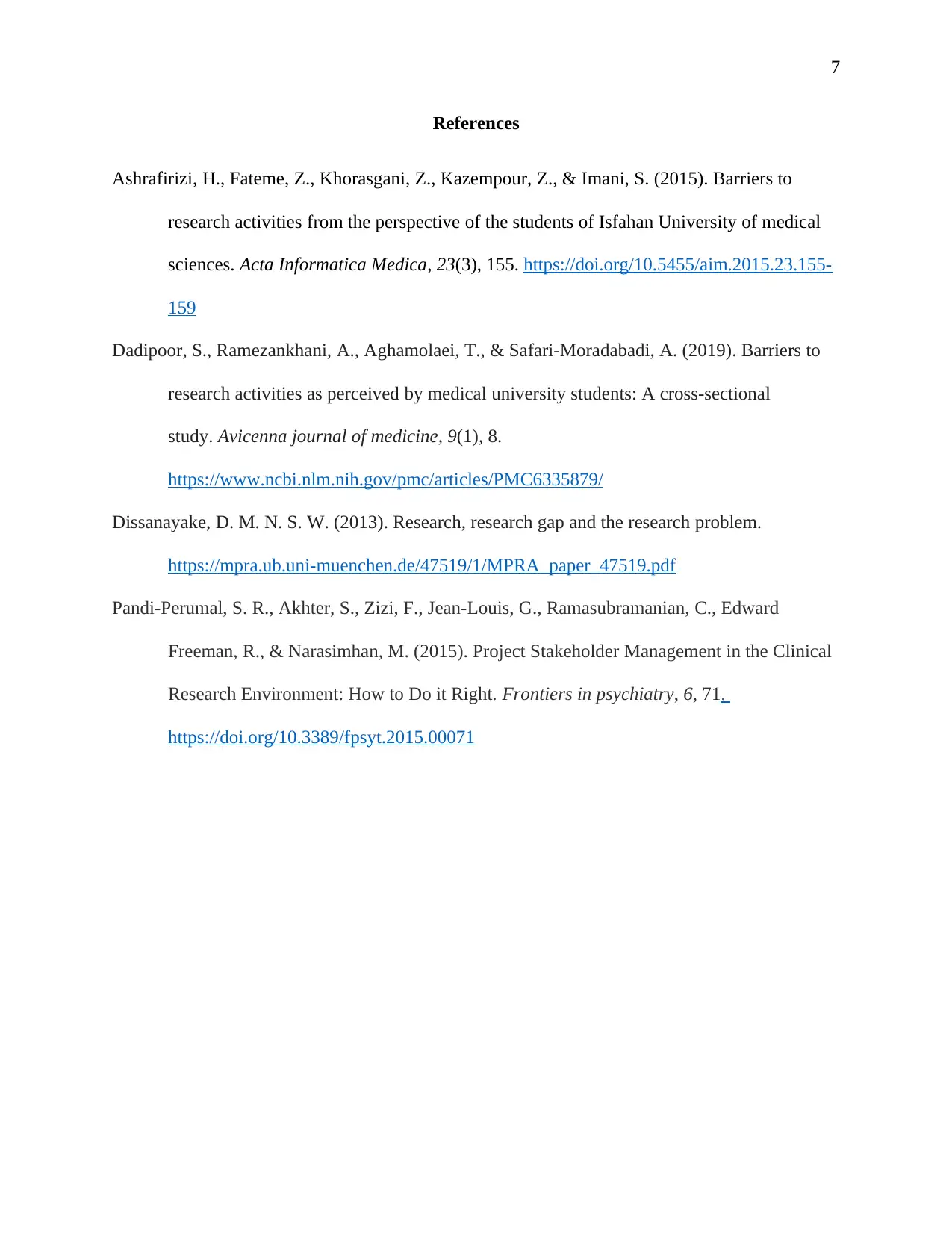
7
References
Ashrafirizi, H., Fateme, Z., Khorasgani, Z., Kazempour, Z., & Imani, S. (2015). Barriers to
research activities from the perspective of the students of Isfahan University of medical
sciences. Acta Informatica Medica, 23(3), 155. https://doi.org/10.5455/aim.2015.23.155-
159
Dadipoor, S., Ramezankhani, A., Aghamolaei, T., & Safari-Moradabadi, A. (2019). Barriers to
research activities as perceived by medical university students: A cross-sectional
study. Avicenna journal of medicine, 9(1), 8.
https://www.ncbi.nlm.nih.gov/pmc/articles/PMC6335879/
Dissanayake, D. M. N. S. W. (2013). Research, research gap and the research problem.
https://mpra.ub.uni-muenchen.de/47519/1/MPRA_paper_47519.pdf
Pandi-Perumal, S. R., Akhter, S., Zizi, F., Jean-Louis, G., Ramasubramanian, C., Edward
Freeman, R., & Narasimhan, M. (2015). Project Stakeholder Management in the Clinical
Research Environment: How to Do it Right. Frontiers in psychiatry, 6, 71.
https://doi.org/10.3389/fpsyt.2015.00071
References
Ashrafirizi, H., Fateme, Z., Khorasgani, Z., Kazempour, Z., & Imani, S. (2015). Barriers to
research activities from the perspective of the students of Isfahan University of medical
sciences. Acta Informatica Medica, 23(3), 155. https://doi.org/10.5455/aim.2015.23.155-
159
Dadipoor, S., Ramezankhani, A., Aghamolaei, T., & Safari-Moradabadi, A. (2019). Barriers to
research activities as perceived by medical university students: A cross-sectional
study. Avicenna journal of medicine, 9(1), 8.
https://www.ncbi.nlm.nih.gov/pmc/articles/PMC6335879/
Dissanayake, D. M. N. S. W. (2013). Research, research gap and the research problem.
https://mpra.ub.uni-muenchen.de/47519/1/MPRA_paper_47519.pdf
Pandi-Perumal, S. R., Akhter, S., Zizi, F., Jean-Louis, G., Ramasubramanian, C., Edward
Freeman, R., & Narasimhan, M. (2015). Project Stakeholder Management in the Clinical
Research Environment: How to Do it Right. Frontiers in psychiatry, 6, 71.
https://doi.org/10.3389/fpsyt.2015.00071
1 out of 7
Your All-in-One AI-Powered Toolkit for Academic Success.
+13062052269
info@desklib.com
Available 24*7 on WhatsApp / Email
![[object Object]](/_next/static/media/star-bottom.7253800d.svg)
Unlock your academic potential
Copyright © 2020–2025 A2Z Services. All Rights Reserved. Developed and managed by ZUCOL.

